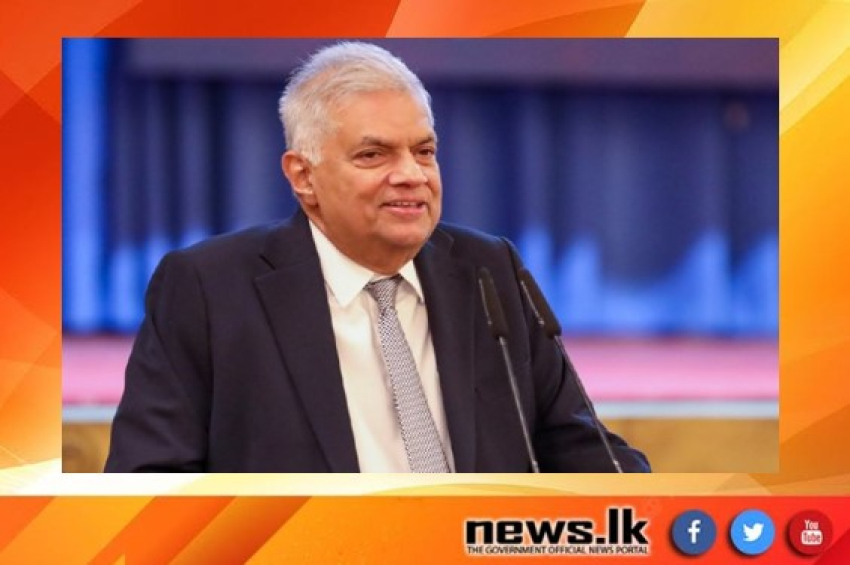In a significant development for Sri Lanka’s governance and policy landscape, the long-pending National Policy on Evaluation has finally been set in motion, marking a pivotal moment in the country’s mission for efficient governance. The policy, which was initiated in 2016 or 2017, was officially declared in 2018 during discussions in Parliament and now, in 2023, it is being hailed as a crucial step towards bringing discipline and consistency to government projects and policies.
President Ranil Wickremesinghe, during his speech at the unveiling of the National Evaluation Policy Implementation Framework held at Temple Trees yesterday morning (on the 8th), underscored the crucial involvement of the Ministry of Finance and the Project Management Department in the policy’s execution. This initiative aims to instil discipline within the government system. Currently, the assessment of expenditures in the top ten highest-spending Ministries is in progress, with the forthcoming reports slated for presentation in Parliament in all three official languages, ensuring transparency.
The President revealed plans to develop a foreign policy paper by the Minister of Foreign Affairs by the end of the year and a long-term defence policy for Sri Lanka by the Ministry of Defence. These initiatives aim to ensure a more consistent and enduring approach to policy-making followed by other ministries in producing a national policy framework.
He also stressed the importance of addressing policy adaptation issues at the ministry level, ensuring that national policies are effectively implemented.
President Ranil Wickremesinghe highlighting the importance of this landmark policy and its implications for the country’s governance stressed the need for a National Evaluation Policy, given the seven-year journey from its inception, which vividly illustrates the need for a comprehensive framework to assess the government’s actions. He lauded the dedication of those involved in crafting the policy, recognizing their remarkable work in making it a reality.
In his address, the President highlighted that the parliamentary session delved into critical matters, shedding light on one pressing issue: the haphazard nature of certain government projects. An illustrative instance brought up was the construction of a canal bridge, necessitating the demolition of three or four-story building. This example vividly exemplifies the challenges encountered in the planning and execution of projects.
President Wickremesinghe highlighted a significant void in Sri Lanka’s governance system—the absence of a consistent national policy. He emphasized the need for continuity in policies, suggesting that parliament-appointed committees should play a central role in creating a national policy framework.
This landmark step towards a more consistent and predictable policy environment in Sri Lanka is seen as essential for the country’s economic growth and overall development. The government officials expressed their commitment to the robust implementation of the National Evaluation Policy, emphasizing the importance of evaluating government actions effectively.
The implementation of the National Evaluation Policy will be overseen by the Ministry of Finance and the Project Management Department, with the objective of instilling discipline and order within the government system. The policy aims to ensure that policies remain consistent, even as governments change, in order to maintain a stable and predictable environment for economic and social development.
Furthermore, the parliamentary session highlighted the need for a broader discussion on national policies, where the role of both the Cabinet and Parliament in policy formulation and implementation will be redefined. The goal is to establish a comprehensive national policy framework that can accommodate changes in policies from government to government, not minister to minister.
As Sri Lanka moves forward with this policy, it aspires to bring about greater consensus on national policies, which will ultimately lead to a well-defined and comprehensive national policy framework.
President Ranil Wickremesinghe also expressed his satisfaction with the progress made during discussions on debt restructuring, noting a noteworthy degree of consensus on the trajectory of national policy. Despite robust debates in the Public Finance Committee, the President acknowledged that substantial agreement had been reached, although amid the intricacies of multi-party considerations inherent to Sri Lanka’s political landscape.
President Wickremesinghe likened the negotiations to the “fog of war,” emphasizing the complexities and intricacies that often characterize Sri Lankan political discussions. He underscored the necessity of moving forward, showing confidence in the growing influence of non-political sectors within society.
In an effort to further shape the national policy landscape, the government will undertake a comprehensive examination of the education system, the transport infrastructure and the irrigation network. These examinations aim to facilitate informed discussions and the formulation of policy papers outlining the fundamental principles of national policy, ultimately contributing to the development of a comprehensive national policy framework.
In conclusion, President Wickremesinghe acknowledged the importance of this policy as a crucial tool to evaluate the government’s actions, especially in the post-economic crisis era. He pledged strong support for the robust implementation of the National Evaluation Policy, emphasizing its significance in shaping Sri Lanka’s future.
Meanwhile, the National Evaluation Policy Implementation Framework Document was presented to President Ranil Wickremesinghe by the Secretary, Ministry of Finance Mr. Mahinda Siriwardhena.
This event was graced by Prime Minister Mr. Dinesh Gunawardhena, State Ministers Mr. Ranjith Siyambalapitiya, Mr. Shehan Semasinghe, Mr. Lasantha Alagiyawanna, Secretaries of the line Ministries, High Commissioners, Ambassadors and other Government Officials.




















